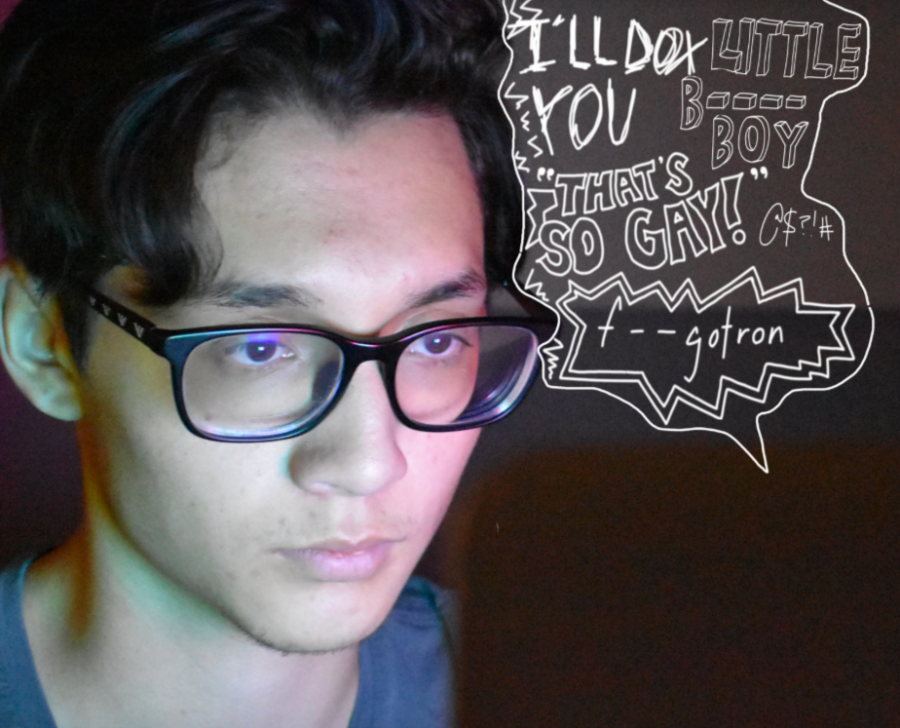In-game impulse: Students and teachers disclose their opinions on toxic gaming
Investigating the toxicity and banter in online gaming communities
December 20, 2019
ccording to science teacher Kyle Jones, in-game offensive banter, which can be defined as negative or racially charged statements or slurs, are a byproduct of the competitive nature of multiplayer games. These negative comments occur when players in a competitive multiplayer setting chastise others for not executing a perfected play. Due to the prevalence of racist and misogynistic spam messages in gaming chats, Jones believes that overusing these words desensitizes their impacts.
“At a certain point [the message doesn’t] even feel like it is racist anymore,” Jones said. “It’s just people trying to say the most offensive thing they can possibly say. It’s almost because it’s so over the top and so clearly attempting to just be very, very, very offensive [that] it almost feels [like] the racism is ruled less sometimes. Which is weird, and you also start to tune it out because it becomes so much.”
Senior Ethan Malone agrees that the overuse of racist remarks desensitizes one to the impact, and says that when gamers lose or experience in-game struggles, derogatory slurs, racist remarks and homophobic language are often thrown out in aggravation. This is coined by Malone as “unhealthy banter” resulting from a lack of “communication” between parties. According to Jones and Malone, the line separating friendly and unhealthy banter is crossed by going beyond “jokes” and instead dropping slurs. While Jones believes that healthy banter can make gaming more collaborative, both Jones and Malone both believe that once such a line is crossed, toxicity breaks apart the community more than it strengthens competitive bonds.
People get behind that mask of anonymity, hence they’ll just say whatever they want — they think they’re super powerful. They think nobody can get them, and nobody will most of the time.”
— Senior Ethan Malone
Video game developers like Riot Games, the creator of League of Legends (LoL), have attempted to combat this problem by heavily filtering their chat streams. According to Malone, in LoL, even something as little as insulting the opposing team or making a remark that could be easily brushed off can result in a penalty or game removal. Malone believes that gaming companies should only intervene to a certain extent and not to the extent that Riot does.
“[Chat filters] just [don’t] seem right to me — I feel like there’s a lot of bad merit in [intervention],” Malone said. “But obviously super offensive [content] doesn’t really have a place in video games, so it’s better just to do without it.”
Although Malone is against complete chat surveillance, he believes that unfiltered chats or streams with lighter intervention aside from basic protection (anti-spam filters and anti-bot filters) perpetuate “hatred” and provide gamers with more opportunities to make toxic comments.
“People get behind that mask of anonymity, hence they’ll just say whatever they want — they think they’re super powerful,” Malone said. “They think nobody can get them, and nobody will most of the time.”
Malone says that such threats are also apparent in the gaming realm. The most common digital threat is ‘doxxing,’ where a person threatens to leak another player’s personal information, such as a user’s address, name and school. Occasionally, such threats can be seen as comical or “petty,” which can be as trivial as ordering pizzas to a player’s home. Malone received a physical threat after playing the first-person shooter game Counter Strike: Global Offensive (CS:GO) when he had a conversation with another player on the popular video chatting app Discord. After finishing a game round, the two had a conversation about Malone’s in- game performance.
He said some really nasty things and how he was going to come up to my house and he was going to pull a knife on me. I didn’t take him seriously, and it never happened.
— Senior Ethan Malone
“He said some really nasty things and how he was going to come up to my house and he was going to pull a knife on me,” Malone said. “I didn’t take him seriously, and it never happened. I added … one of his friends on Steam that looked like they knew each other, and I was like, ‘Hey, do you know [if] he’s up to this stuff?’ And [the friend was] like ‘no.’ It kind of goes to show that really anyone can make the threats, even your friends.”
Malone claims that this incident is an example of the inconsistency behind online threats, especially when exchanged during gaming. Real-time voice chats foster an intense environment where users are fueled by both the safety of anonymity and the adrenaline of competition. For many competitive multiplayer games, such as CS:GO, success depends on the performance of often anonymous teammates, as well as initiating, building and maintaining team support throughout the round. Similarly, sophomore Cash Bowman has also encountered threats online while playing the first person shooter Call of Duty, when another player found his IP Address and posted it on the Twitch stream chat, threatening that he was “coming for [Bowman].” Bowman believes that threats like the one he encountered are a result of gamers taking out their real life frustrations online.
“Some of [the threats] probably could translate to actual danger,” Bowman said. “But I’m fine, so that’s good … people are mad, and they just take it out during video game sessions.”
Bowman believes real-life feelings translate to in-game toxicity, and Malone similarly recognizes that online toxicity can bleed past the screen into reality. Malone has observed within his own friend group that those who participate in offensive banter while gaming can start to “slip up” and use language that they would use in an unfiltered game chat.
“If my friend gets really upset during a game, usually if not always I will see that somehow reflected the next day at school,” Malone said. “They’ll slip up a bit, they’ll make a small mistake and usually it’s because they’re caught off guard and it’s because they had a bad experience the night before. But I think most of the time it’s easy to see the effects that your online attitude has on your real life attitude. I think they’re really just the same thing.”


















